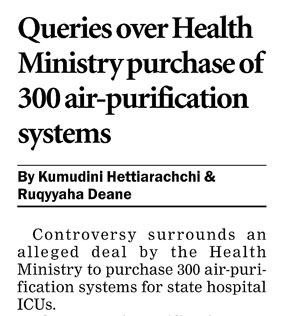News
Ministry cancels controversial air-purification deal
The purchase of 300 air-purification systems by the Health Ministry under a controversial COVID-19 deal is to be cancelled after a top-level meeting this week, two weeks after the Sunday Times exposed alleged irregularities in the proposed transaction.

The story as reported in the Sunday Times of May 3, 2020
The meeting’s minutes which were circulated later to several stakeholders had stated that “the committee has decided to cancel the purchase,” the Sunday Times reliably understands.
Chaired by a Health Ministry Additional Secretary, the meeting, held at 2 p.m. on Wednesday (May 13) at the ministry, had discussed and debated the pros and cons and technical aspects of such air-purification systems for state hospitals as a measure to prevent the spread of COVID-19.
The meeting was attended by a large number of people including officials from the ministry’s Medical Services, Planning, Bio-medical Engineering Services and Laboratory Services and representatives from the College of Anaesthesiologists & Intensivists and the College of Microbiologists, a ministry source said.
There were many differing views on the suitability of these air-purification systems, the source said, while another pointed out that such systems are not stand-alone units but should be part of a complex system which includes a sucking and duct system. Another source said they also focused on the adverse and harmful impacts of these air-purification systems.
The question which remained unanswered by many ministry officials and which the Sunday Times has highlighted is how a request for these air-purification systems originated from the ministry on April 3 and bids were invited and even sent for evaluation to the ministry by the procurement agency, UNICEF, long before state hospitals requested them. That is the normal process.
This means that due processes have not been followed, specs and technical aspects have not been thrashed out, indicating that there wasn’t full transparency and something was not right with regard to this deal, many sources alleged.
In-depth details about the proposed procurement and how numerous ministry officials remained tightlipped were reported by the Sunday Times in two exposes headlined ‘Air purifiers for hospitals: All’s not clean’ on May 10 and ‘Queries over Health Ministry purchase of 300 air-purification systems’ on May 3.
These 300 air-purification systems/air sterilisers said to cost in total more than Rs. 300 million were part of a list of items due to be bought through a World Bank loan of US$ 128.6 million under ‘Sri Lanka’s COVID-19 Emergency Response and Health Systems Preparedness’ Project.
Box please
The air-purification systems have been removed from the list, said Dr. Jayasundara Bandara, the Director of ‘Sri Lanka’s COVID-19 Emergency Response and Health Systems Preparedness’ Project, who readily agreed to meet the Sunday Times on Thursday.
“I cannot accept that list as it is, because it needs approval,” he said, explaining that he wants the Secretary and some experts from the Health Ministry to take the final decision after getting expert opinion. The final decision is expected next week.
When the Sunday Times queried as to who wanted these air-purification systems, Dr. Bandara said: “I don’t quite know exactly who wanted these air purifiers. When I asked, they said that anaesthetists have requested them. Then I contacted the microbiologists and they sent me their reports and they are saying that microbiologically they have not recommended. In the original list, there was a request for 300 systems, they have not given me the amended list yet, but I heard that they are removing them (air-purification systems).
“For equipment such as this, we said we would provide the information but the decision should be taken by a top team who can really make policy decisions and be held accountable. This hadn’t been done yet, but with the new Secretary it will be done soon. We will await the Secretary’s recommendation.”
Dr. Bandara stressed that they have not confirmed anything. “This is not just a shopping list we can spend on. We said earlier that we cannot make any hurried decisions so we are still evaluating and have asked the Secretary to appoint a committee. The project will not rush into purchases, but let the ministry evaluate the dire need and what should be the delivery time. Accordingly we will take the decision.”
When asked how the procurement agency, UNICEF, sent a list of bids after inviting such bids, he said that there were two – the local market survey and the availability globally.
“The local market survey list which collects the local bidders went directly to the Medical Supply and Biomedical Divisions. Then only did I ask for the list,” said Dr. Bandara, adding that it is thereafter that those two lists would be evaluated.


